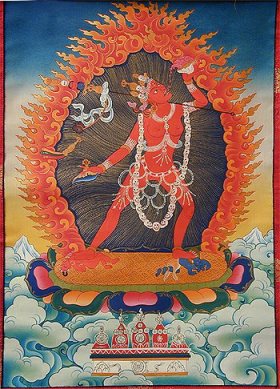Vajrayogini: Difference between revisions
Kent Sandvik (talk | contribs) m (Changed category to Tantric deity, lha - normal deity :-).) |
Kent Sandvik (talk | contribs) No edit summary |
||
| (9 intermediate revisions by 3 users not shown) | |||
| Line 1: | Line 1: | ||
[[Vajrayogini]] ([[rdo rje rnal 'byor ma]]). A [[ | [[Image:Vajrayogini.jpg|frame|[[Vajrayogini, in the Naropa tradition]]]] | ||
[[Vajrayogini]] ([[rdo rje rnal 'byor ma]]). A semiwrathful [[yidam]]. She is red, with one face and two arms, young and beautiful but enraged and wearing ornaments of human bones. She represents the transformation of ignorance and passion into [[shunyata]] and [[compassion]]. | |||
In India there were many [[Vajrayogini]] traditions, only few were transmitted to Tibet. | In India there were many [[Vajrayogini]] traditions, only few were transmitted to Tibet. | ||
In the [[Kagyu | In the [[Kagyu]] tradition, her [[sadhana]] is often given as the students's entry into [[Anuttara Yoga]] practice. In this tradition [[Vajrayogini]] is called [[Vajravarahi]]. | ||
The Sakya tradition has a special [[Vajrayogini]] lineage going back to [[Naropa]], who only transmitted this lineage to the Phamthingka brothers, and from them it was transmitted to the [[Sakya]] lineage in Tibet. | The Sakya tradition has a special [[Vajrayogini]] lineage going back to [[Naropa]], who only transmitted this lineage to the Phamthingka brothers, and from them it was transmitted to the [[Sakya]] lineage in Tibet. | ||
| Line 9: | Line 11: | ||
The [[Gelug]] tradition received the lineage from the [[Sakya]] lineage, and it's now a separate lineage. | The [[Gelug]] tradition received the lineage from the [[Sakya]] lineage, and it's now a separate lineage. | ||
[[rje btsun mkha' spyod rdo rje btsun mo]] - vajrayogini as khechari [RY] | |||
[[rje btsun nA ro mkha' spyod ma]] - vajrayogini khecari teachings handed down from Naropa [RY] | |||
[[dus mtshan]] - kalaratri (hindu goddess on whom vajrayogini tramples), king of kalinga, descendant of chakravarti raja [JV] | |||
See Also [[Vajra Yogini]] and [[Vajra yogini]] | |||
[[bdud mgon]] - maranatha, [Epithet of gayadhara, the protector of the vajrayogini sadhana] [RY] | |||
[[me]] - 1) fire, flame, ember [Notes this is to describe the source of dharmas in vajrayogini's secret place, another suggestion was "glowing like a fire mandala"]; 2) anaka, (the 50th year, male fire dragon) [IW] | |||
[[Category:Tantric | [[Category: Key Terms]] [[Category: Mahayana]][[Category: Sutra]] [[Category: Vajrayana]] [[Category: Tantra]] [[Category: Tantric Deities]] [[Category: Teachings]] [[Category: Rime']] | ||
Latest revision as of 14:38, 19 October 2007
Vajrayogini (rdo rje rnal 'byor ma). A semiwrathful yidam. She is red, with one face and two arms, young and beautiful but enraged and wearing ornaments of human bones. She represents the transformation of ignorance and passion into shunyata and compassion.
In India there were many Vajrayogini traditions, only few were transmitted to Tibet.
In the Kagyu tradition, her sadhana is often given as the students's entry into Anuttara Yoga practice. In this tradition Vajrayogini is called Vajravarahi.
The Sakya tradition has a special Vajrayogini lineage going back to Naropa, who only transmitted this lineage to the Phamthingka brothers, and from them it was transmitted to the Sakya lineage in Tibet.
The Gelug tradition received the lineage from the Sakya lineage, and it's now a separate lineage.
rje btsun mkha' spyod rdo rje btsun mo - vajrayogini as khechari [RY]
rje btsun nA ro mkha' spyod ma - vajrayogini khecari teachings handed down from Naropa [RY]
dus mtshan - kalaratri (hindu goddess on whom vajrayogini tramples), king of kalinga, descendant of chakravarti raja [JV]
See Also Vajra Yogini and Vajra yogini
bdud mgon - maranatha, [Epithet of gayadhara, the protector of the vajrayogini sadhana] [RY]
me - 1) fire, flame, ember [Notes this is to describe the source of dharmas in vajrayogini's secret place, another suggestion was "glowing like a fire mandala"]; 2) anaka, (the 50th year, male fire dragon) [IW]
